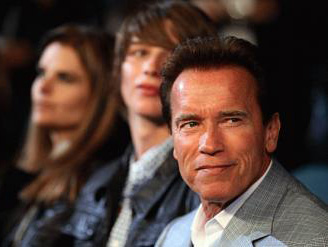A state appeals court said Gov. Arnold Schwarzenegger distorted the evidence to justify blocking the parole of a San Francisco man who murdered a Mission District security guard in 1993.

Gov. Arnold Schwarzenegger's reasons for denying a San Francisco killer's parole were not supported by the evidence, the court says. (Jed Jacobsohn / Getty Images)
Wednesday's ruling by the First District Court of Appeal in San Francisco reinstates the Board of Parole Hearings' June 2008 decision granting parole to Joseph Calderon. The court said no evidence in Calderon's record before or during his imprisonment supported Schwarzenegger's November 2008 conclusion that he would be dangerous if released.
The court said California judges are increasingly finding that Schwarzenegger lacks evidence for decisions that overrule the parole board, whose members he appoints. The Republican governor overturned the board's grants of parole nearly 60 percent of the time in 2008 and more than 70 percent in 2009, according to records cited by the court.
His predecessor, Gov. Gray Davis, overruled the parole board in nearly every case. A voter-approved law allows governors to veto the release of inmates, mostly convicted murderers, serving life terms with the possibility of parole.
Calderon's case raises the question of whether the governor's decision was the product of a "political calculation" rather than a close look at the facts, said Presiding Justice J. Anthony Kline in the 3-0 ruling.
Schwarzenegger's office is reviewing the decision, said spokeswoman Rachel Arrezola. The governor could appeal to the state Supreme Court.
Calderon was 23 in October 1993 when he and two friends, after an evening of drinking, decided to rob Mission News, an adult bookstore near 17th and Mission streets, the court said. When Calderon pulled a gun on the clerk, security guard John Ybarra drew his own gun and opened fire. Calderon shot back while being chased and hit Ybarra, fatally wounding him.
Calderon, who had several previous drug and alcohol convictions, pleaded guilty to second-degree murder and was sentenced to 18 years to life in prison.
The parole board's 2008 decision found that Calderon had consistently accepted responsibility for his crimes, behaved well in prison, undergone alcoholism treatment and other therapy programs and received favorable mental health evaluations. He briefly joined a prison gang in the early years but then dropped out and gave a briefing to prison officials, an action that the board said showed courage and maturity.
In overruling the board, Schwarzenegger said Calderon lacked "full insight" into his crimes, had taken part in rehabilitation programs only sporadically, and had continued his criminal behavior in prison, as shown by his gang membership. The court said the evidence contradicted those conclusions.
Calderon's admission of gang membership was a forthright disclosure that Schwarzenegger would punish him with by using it as a reason to deny parole, Kline said. He said the governor's assessment of Calderon's rehabilitation and lack of insight "distorts the record."
Calderon's lawyer, Michael Beckman, said he hopes Schwarzenegger "will take these cases seriously and let the parole board do its job."











